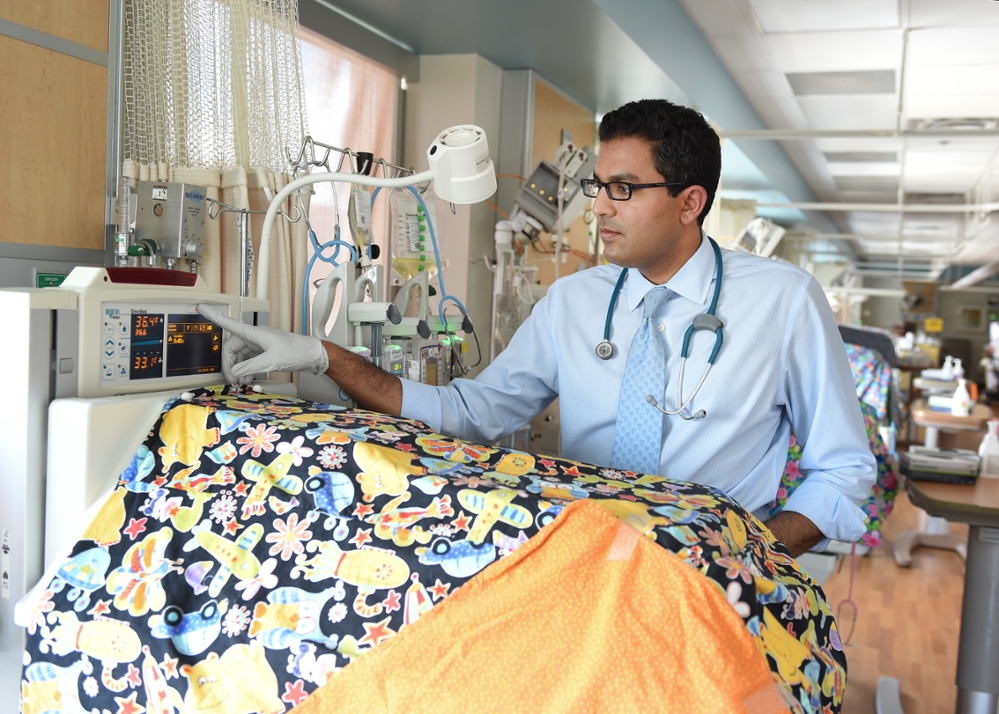ACTSI Scholar Links Severe Anemia to Intestinal Disease Risk in Premature Infants

Ravi Mangal Patel, MD, MSc, former Atlanta Clinical & Translational Science Institute (ACTSI) KL2 Mentored Clinical and Translational Research Scholar, and 2014 graduate of the ACTSI Master of Science in Clinical Research (MSCR) program, was the first author of a recent Journal of the American Medical Association (JAMA) publication entitled, “Association of Red Blood Cell Transfusion, Anemia, and Necrotizing Enterocolitis in Very Low-Birth-Weight Infants.” In this study, Patel and colleagues in the Emory University School of Medicine, the Rollins School of Public Health, Children’s Healthcare of Atlanta, and Northside Hospital, found that severe anemia, but not red blood cell (RBC) transfusions was associated with an increased risk for necrotizing enterocolitis (NEC) in very low birth weight infants.
Necrotizing enterocolitis, a condition in which cells of the intestine become inflamed and intestinal tissue dies, is a leading cause of death among premature infants. However, the exact cause of NEC is unclear, and there are conflicting results from studies about the effect of RBC transfusions and anemia on the development of NEC. In this prospective observational study, the authors evaluated whether RBC transfusions, or severe anemia were associated with an increased risk for NEC. Six hundred infants weighing 1,500 grams or less at birth were enrolled from neonatal intensive care units at Emory University Hospital Midtown, Grady Memorial Hospital, and Northside Hospital. Forty-four infants developed NEC. RBC transfusions in a given week were not related to risk of NEC. However, infants with severe anemia (a condition in which the amount of hemoglobin or RBCs in the blood is reduced, impairing oxygen transport in the body) had a 5.99 times higher risk for developing NEC compared to infants who were not severely anemic. Read more about this study at the Emory News Center.
This study was funded in part by the National Heart, Lung, and Blood Institute, as well as ACTSI and Emory-Children’s Center for Clinical and Translational Research. “The support and training that I received through the KL2 and MSCR programs were instrumental to the development and success of this study,” said Patel, assistant professor of pediatrics at Emory University School of Medicine and Children’s Healthcare of Atlanta.
The goal of the ACTSI KL2 Mentored Clinical and Translational Research Scholars Program is to support career development for junior faculty (MD, PhD, or MD/PhD) from a wide variety of disciplines at Emory University, Morehouse School of Medicine (MSM), and Georgia Institute of Technology (Georgia Tech) to become independent, established, and ethical clinical and/or translational research investigators. The Emory Master of Science in Clinical Research (MSCR) degree program, from the Laney Graduate School at Emory University, provides didactic and mentored clinical and translational research training. The degree is designed for participants at Emory University and Georgia Tech who hold a doctorate or equivalent degree (such as physicians and PhD-level scientists) or predoctoral trainees enrolled in a dual degree program (MD/MSCR and PhD/MSCR tracks) and have demonstrated a commitment to a career in clinical investigation.
The ACTSI is a city-wide partnership between Emory, Morehouse School of Medicine, and Georgia Tech and is one of a national consortium striving to improve the way biomedical research is conducted across the country. The consortium, funded through the National Center for Advancing Translational Sciences as one of the National Institutes of Health’s Clinical and Translational Science Awards, shares a common vision to translate laboratory discoveries into treatments for patients, engage communities in clinical research efforts, and train the next generation of clinical investigators.